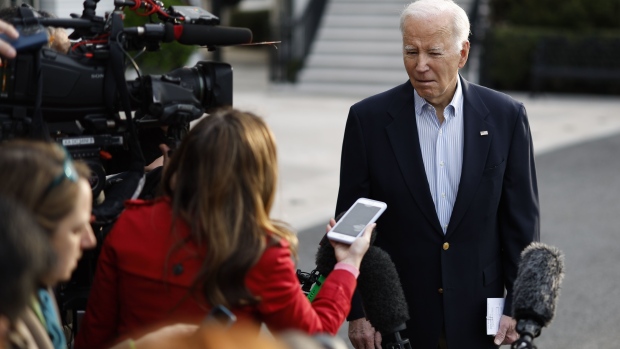Mar 31, 2023
SVB Collapse Weighs on Biden’s Search for Fed Vice Chair
, Bloomberg News

(Bloomberg) -- President Joe Biden has narrowed his search for a Federal Reserve vice chair to a handful of candidates, as the White House moves to fill the post after triaging the collapse of Silicon Valley Bank, according to people familiar with his deliberations.
Biden’s decision is expected in the coming weeks and a small number of potential nominees are in the running, the people said, speaking on condition of anonymity as discussions continue. Northwestern University Professor Janice Eberly has been seen as a frontrunner and remains under consideration, but it is not clear who the other finalists might be.
The nomination will come in the wake of the administration’s efforts to backstop deposits and stem fallout after the failure of two regional banks, SVB and Signature Bank, that raised fears of contagion and a broader financial crisis. The White House said this week it believes the situation has stabilized and called for tighter rules on banks.
In the aftermath of the SVB ordeal, two people said the White House was seeking a candidate with experience in both monetary and regulatory policy, while another stressed that regulation is the purview of the existing Vice Chair of Supervision — Michael Barr, a Biden nominee — and isn’t a requirement for the forthcoming pick.
Biden is looking to fill the opening at the central bank created by former Vice Chair Lael Brainard’s move to the White House last month to head the National Economic Council.
The president is juggling pressures from his own party as he weighs a replacement. Progressives, including Massachusetts Senator Elizabeth Warren, have urged him to nominate someone as a counterweight to Fed Chair Jerome Powell and his interest rate increases and as a voice for tougher banking regulations.
Biden also faces calls from some lawmakers, such as Senator Robert Menendez of New Jersey, to nominate a Latino candidate. The White House has said a diverse pool of candidates is being considered for the post.
The president this week indicated deliberations were ongoing. “We’re talking about it,” he told reporters Tuesday in North Carolina. “That’s underway right now.” The White House declined to comment.
The nominee, if confirmed by the Senate, would join the Fed as it grapples with when to pause its interest rate increases, torn between concerns about curbing inflation and fears of exacerbating instabilities in the banking system.
Federal Reserve Bank of New York President John Williams said Friday it’s not yet clear how much the recent banking turmoil will affect credit conditions, and that policymakers will rely on the data to guide their future policy decisions.
Eberly is a former chief economist at the Treasury Department and is seen by analysts as a more dovish candidate, similar to Brainard — one who might believe the Fed can confront inflation without deep job losses or significant further rate hikes.
The Fed has also launched an investigation into the events that led to the collapse of SVB. Congress is likely to open its own inquiries.
The White House on Thursday proposed a slate of tougher rules and more frequent stress tests for mid-sized banks that bear Brainard’s fingerprints. As vice chair, she frequently warned that financial deregulation legislation passed in 2018 went too far, including for banks with deposits between $100 billion and $250 billion — a category that SVB and Signature fell into. Republicans decried that as a partisan move.
Senate Banking Committee Chair Sherrod Brown said last week, after SVB collapsed, that he was “not convinced anybody” is the frontrunner, and added that the absence of Senator John Fetterman was a factor in any nominee advancing through the committee. Fetterman, a Pennsylvania Democrat, is scheduled to return after the Easter recess.
Other people who’ve been said to be candidates have seen their circumstances change.
Harvard University professor Karen Dynan and Morgan Stanley Chief Global Economist Seth Carpenter have each been giving public remarks since the search began, typically a signal that they’re not under a blackout period that accompanies late-stage vetting.
San Francisco Fed President Mary Daly, meanwhile, is in the center of the storm over whether regulators missed warning signs at SVB — a dynamic that would substantially complicate her candidacy.
--With assistance from Jenny Leonard.
©2023 Bloomberg L.P.


